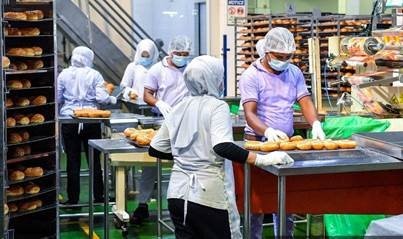
PETALING JAYA: The government has been urged to introduce initiatives to make Malaysia a food processing hub and to invest in cybersecurity to give the manufacturing sector a boost.
According to the Federation of Malaysian Manufacturers (FMM), the country already has enormous potential to become a world-class centre for food processing given its position as a halal food producer.
“The vision now should be to extend our capabilities beyond the halal market,” FMM president Soh Thian Lai told FMT Business.
This is one of many initiatives that should be included in Budget 2024, which will be tabled at the Dewan Rakyat on Friday, he said.
The manufacturing sector accounted for 8.1% of Malaysia’s total GDP in 2022, down from 9.5% in 2021.
Soh said a public-private sector strategic partnership is essential to build a dynamic food ecosystem.
“This should come with an integration of the agro-food value chain, from farming to manufacturing and services,” he said.
He said the government has a role to play in forging such a partnership.
Soh said Malaysia should also take the lead in creating a worldwide food processing hub to enhance food security.
He said Malaysia’s pioneering role in the halal food production system made it the natural choice to lead such an initiative.
He said there should also be initiatives to help micro, small and medium enterprises (MSMEs) to integrate themselves into the global food supply chain.
“This is a strategic move. It is also vital for economic growth and resilience,” he said.
Soh said the move, combined with the participation of established players, would result in greater value-add for the Malaysian economy.
“This will mean profitability for businesses, good job opportunities for the rakyat, and additional revenue streams for the government,” he said.
He also commended the government for setting aside a million acres spread across Sabah, Sarawak and Peninsular Malaysia for its food processing hub initiative.
He said this would attract investments from within the country and abroad. “It will boost economic growth, create jobs and support entrepreneurship, all with the ultimate goal of increasing the nation’s GDP.”
Gaining access to the international market
Bank Muamalat chief economist Afzanizam Rashid said offering incentives to local manufacturers to help them upgrade the skills of their workers, improve operations and raise productivity would help them gain wider access to the international market.
“In this regard, participation in multilateral trade agreements such as the CPTPP and RCEP can be a stepping stone to a potentially vast market,” he told FMT Business.
The CPTPP, or Comprehensive and Progressive Agreement for Trans-Pacific Partnership, is a multilateral trade agreement among 12 countries – Australia, Brunei, Canada, Chile, Japan, Malaysia, Mexico, New Zealand, Peru, Singapore, the UK and Vietnam.
The RCEP, or Regional Comprehensive Economic Partnership, is the world’s largest free trade area in terms of gross domestic product, involving 15 countries with a population of 2.2 billion.
One-off tax deduction for SMEs
Apart from incentives, stakeholders also single out improvements in cybersecurity as essential in raising local manufacturers to the next level.
Soh said the government could help by offering a one-off tax deduction to SMEs to encourage them to invest in cybersecurity.
He said that apart from boosting connectivity, it is also essential to enhance the country’s digital infrastructure, simplify regulatory frameworks and to formulate technology-friendly policies.
“Encourage digital adoption among SMEs by offering them attractive grants or rebates, as their primary concern is affordability,” he said.
Source: https://www.freemalaysiatoday.com/category/highlight/2023/10/11/focusing-on-food-is-the-way-forward-says-business-group/

